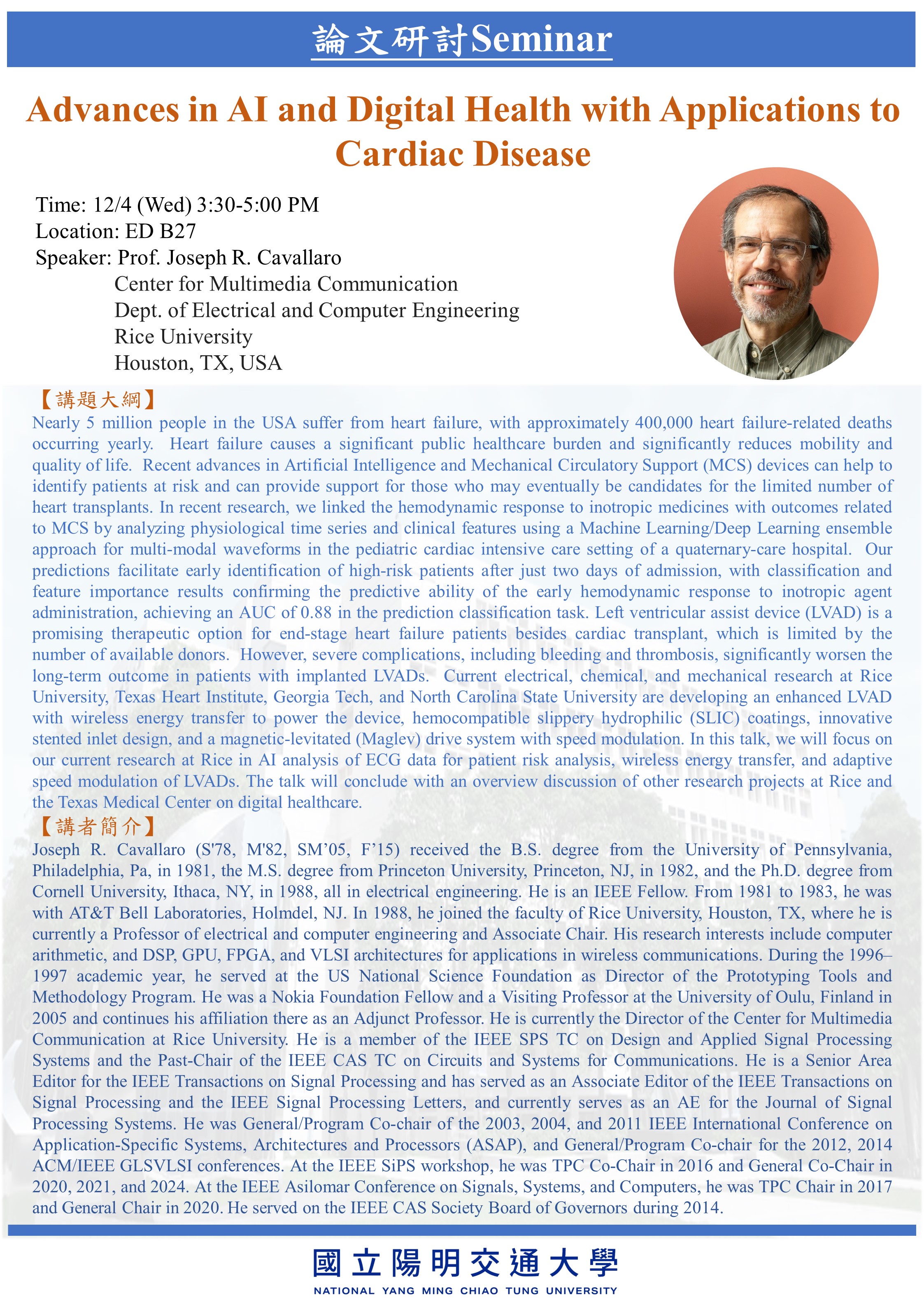【論文研討Seminar】113/12/04(Wed) 15:30-17:30 @ED B27。Speaker: Prof. Joseph R. Cavallaro講題:Advances in AI and Digital Health with Applications to Cardiac Disease
- Published on
- Author
- 許詩婷
講題: Advances in Wireless Communication for 6G Systems: Algorithms, Architectures, and Testbeds
Time: 12/4( Wed) 15:30-17:30
Location: ED B27
Speaker: Prof. Joseph R. Cavallaro
Center for Multimedia Communication
Dept. of Electrical and Computer Engineering
Rice University
Houston, TX, USA
【講題大綱】
Wireless communication system concepts for 6G include a variety of advanced physical layer algorithms to provide high data rates and increased efficiency. All of these wireless algorithms provide different challenges for real-time performance based on the tradeoffs between computation, communication, and I/O bottlenecks and area, time, and power complexity.
In particular, Massive MIMO systems provide many benefits for both uplink detection and downlink beamforming as the number of base station antennas increases. However, RF power amplifier nonlinearities require compensation with digital pre-distortion (DPD) to improve power amplifier efficiency, transmission range, and beamforming quality. The nonlinearities of RF power amplifiers in transmitters are rather unique and can be observed as a signature. Radio frequency fingerprint identification (RFFI) emerges as a non-cryptographic technique for secure device identification that exploits the unique and stable hardware impairments of radio devices as their identifiers. Machine learning algorithms and architectures can be trained to recognize these known devices. RFFI is an example infrastructure dimension explored in the three dimensions of machine learning (3DML) project at Rice which also includes a labeled data collection dimension from the Rice RENEW testbed and the client dimension which is an automated model-builder to automatically generate efficient ML models.
In this talk, we will also discuss our new testbed. In this project, Houdini, will be a software-defined radio system to support new bands, enable simultaneous access to multiple bands of interest, empower multiple research communities in wireless networking, sensing and imaging, and enable diverse datasets to support advanced AI/ML research. The talk will conclude with a summary of the history of wireless testbeds at Rice University. The integration with radio testbeds from WARP and the Argos massive MIMO systems will first be explored. Then lessons learned from several National Science Foundation testbeds including Platforms for Advanced Wireless Research (PAWR) POWDER-RENEW, the 3DML AI enhancements, and the new wideband integrated sensing and communications Houdini testbed will be presented.
【講者簡介】
Joseph R. Cavallaro (S'78, M'82, SM’05, F’15) received the B.S. degree from the University of Pennsylvania, Philadelphia, Pa, in 1981, the M.S. degree from Princeton University, Princeton, NJ, in 1982, and the Ph.D. degree from Cornell University, Ithaca, NY, in 1988, all in electrical engineering. He is an IEEE Fellow. From 1981 to 1983, he was with AT&T Bell Laboratories, Holmdel, NJ. In 1988, he joined the faculty of Rice University, Houston, TX, where he is currently a Professor of electrical and computer engineering and Associate Chair. His research interests include computer arithmetic, and DSP, GPU, FPGA, and VLSI architectures for applications in wireless communications. During the 1996–1997 academic year, he served at the US National Science Foundation as Director of the Prototyping Tools and Methodology Program. He was a Nokia Foundation Fellow and a Visiting Professor at the University of Oulu, Finland in 2005 and continues his affiliation there as an Adjunct Professor. He is currently the Director of the Center for Multimedia Communication at Rice University. He is a member of the IEEE SPS TC on Design and Applied Signal Processing Systems and the Past-Chair of the IEEE CAS TC on Circuits and Systems for Communications. He is a Senior Area Editor for the IEEE Transactions on Signal Processing and has served as an Associate Editor of the IEEE Transactions on Signal Processing and the IEEE Signal Processing Letters, and currently serves as an AE for the Journal of Signal Processing Systems. He was General/Program Co-chair of the 2003, 2004, and 2011 IEEE International Conference on Application-Specific Systems, Architectures and Processors (ASAP), and General/Program Co-chair for the 2012, 2014 ACM/IEEE GLSVLSI conferences. At the IEEE SiPS workshop, he was TPC Co-Chair in 2016 and General Co-Chair in 2020, 2021, and 2024. At the IEEE Asilomar Conference on Signals, Systems, and Computers, he was TPC Chair in 2017 and General Chair in 2020. He served on the IEEE CAS Society Board of Governors during 2014.
